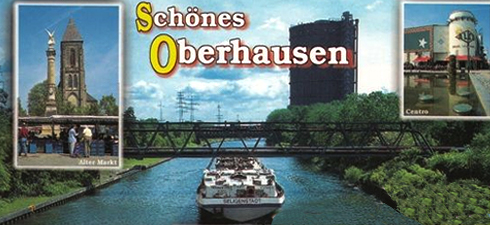The Centro luxury mall on the outskirts of Oberhausen does not exactly exude an air of poverty. But if one is to believe Gabriele Daume, an elegant patron with a pearl necklace, all the money is heading east into the former GDR, while the west is getting poorer.
According to her, the Centro mall is trying to hide the misery. Oberhausen has closed five of its seven swimming pools, the concert hall has been shut down, and so has the bookmobile. Jobs are disappearing, and young people are leaving. “And that's happening everywhere in the west.”
The new poor and needy East
Suddenly, the separation between East Germany and West Germany is back on the agenda. This time, though, it has swung about 180 degrees. Ask here in Oberhausen and, 22 years after the fall of the Wall, you will hear an unexpected message: once at the heart of the West German economic miracle, the Ruhr basin has become the new East, poor and needy.
With an election campaign underway in North Rhine-Westphalia, the political class has made its contribution to the show of anger. Four Social-Democratic mayors in the Ruhr have called for the “Solidarpakt II”, the solidarity pact drawn up twenty years ago by the government to let West Germans contribute to help their brothers in the East after the fall of the Wall, and recently extended to 2019, to instead be abandoned.
The mayors seem to have touched a raw nerve. Even Joachim Gauck, the new Federal president and first East German to hold the highest office of the State, shows some understanding for the anger of the West.
The Ruhr still has wealthy regions, but in cities like Duisburg and Dortmund there are area that, according to Gauck, “look like the GDR after the fall of the Wall.” The streets are full of potholes and lined with houses that have been condemned.
Nicknamed the “Greece” of Germany, Oberhausen is Germany’s most indebted city. A debt of nearly €2 billion spread over a population of 211,000 inhabitants comes to €8,000 per person.
Severe austerity policies have been imposed on the city. At 12 percent, unemployment here corresponds to the average of the Länder of the former East Germany. Oberhausen has also paid 270 million euros to the former East Germany, even though it had to borrow the money to pay it.
Gabriele Daume and her friend know how things got to such a state. The Ruhr basin has had its problems because of the gradual closure of many iron ore and coal mines starting in the 1980s. The region has failed to move towards a new and modern economy.
“What do I have to do with what my ancestors did?”
The old mining city is trying to get there through expensive projects. It built zealously outside the centre: the Centro, an industrial building converted into a luxury shopping centre; a golden casino; the Sea Life Centre, where Paul the octopus made his legendary predictions at the 2010 World Cup.
But it is in the city centre, with its many old and run-down working-class neighbourhoods, where we see the harsh reality. The unemployment rate there is significant: stores are closing one after the other and thousands of public service jobs are being wiped out.
Christian Barth, 26, from Oberhausen, is one of the last representatives of the long tradition of the Ruhr. He is a miner in a salt mine and thinks he pays a contribution of “between 25 and 50 euros per month” to the east. He wants that to stop. This money is wasted on luxury projects, he feels, and “if things go badly here, they don’t help us, do they?” He feels no ties to the East: “What do I have to do with what my ancestors did?”
The only place we hear of “mutual solidarity” is at a container in the city centre. The Geheimagentur art group has mounted an idealistic project to find solutions to the problems of poverty in the city.
They are distributing “Kohle für alle“ (‘coals’ – slang for money – for everyone): a fictitious currency that citizens can take into some fifty stores in exchange for goods and services, so promoting “solidarity”. Citizens can also earn the ‘coals’ by doing good deeds for the community – unpaid work, for example. For the artists, the anger of the West towards the East is an expression of “jealousy” – fuelled by the electoral struggles.
For Hannelore, 72, who just registered for “Coals for all”, the solidarity pact “should not operate only from West to East”. Of one thing, after all, she is sure: “The need today is right here. Here there are potholes in the street everywhere, and over there they all have new streets, right?”
In some East German cities the infrastructure was indeed restored, thanks to hundreds of billions in “funds from the West”. Dresden now looks better than Duisburg. Jena has an unemployment rate of 7.3 percent, which is significantly lower than in the Ruhr basin. But in terms of economic power, the East is still far behind the West, with a 12 percent unemployment in the East against seven percent nationally.
Do you like our work?
Help multilingual European journalism to thrive, without ads or paywalls. Your one-off or regular support will keep our newsroom independent. Thank you!












